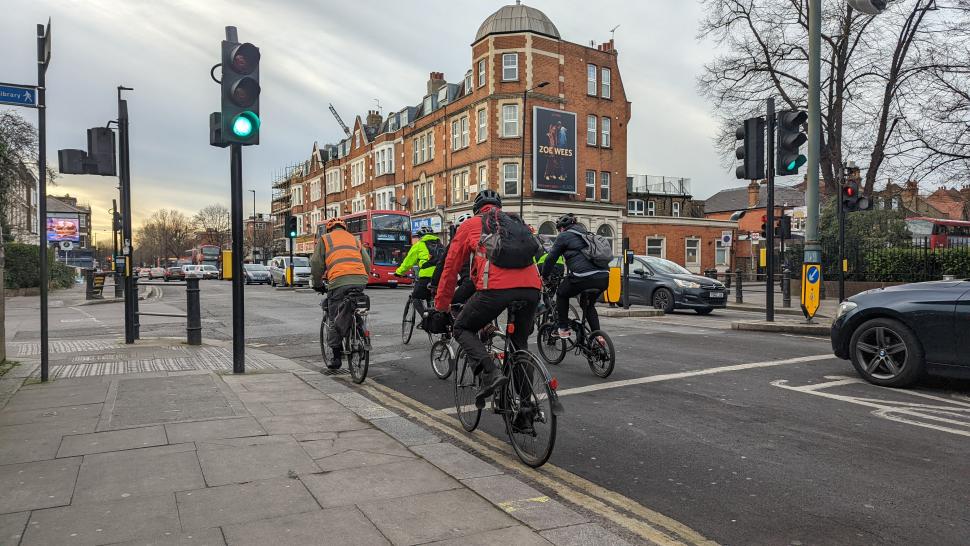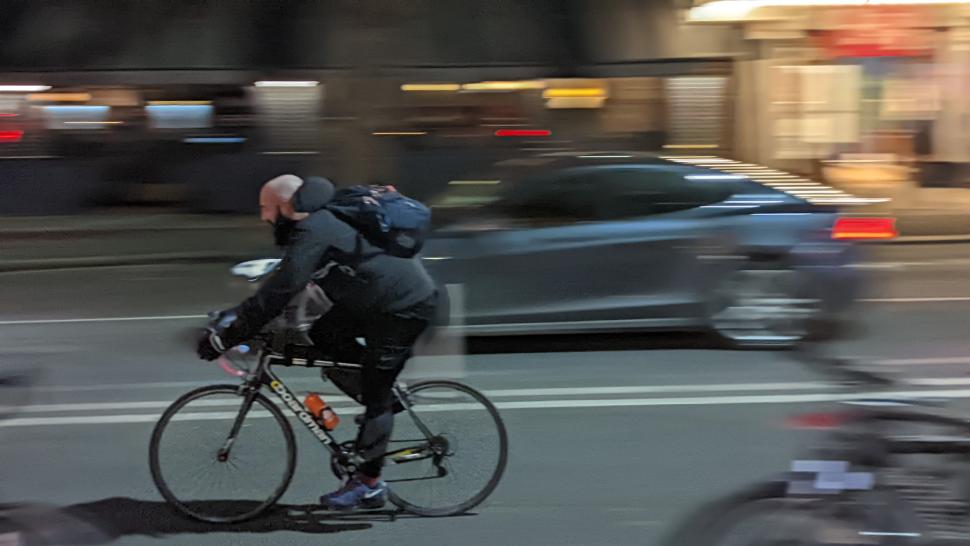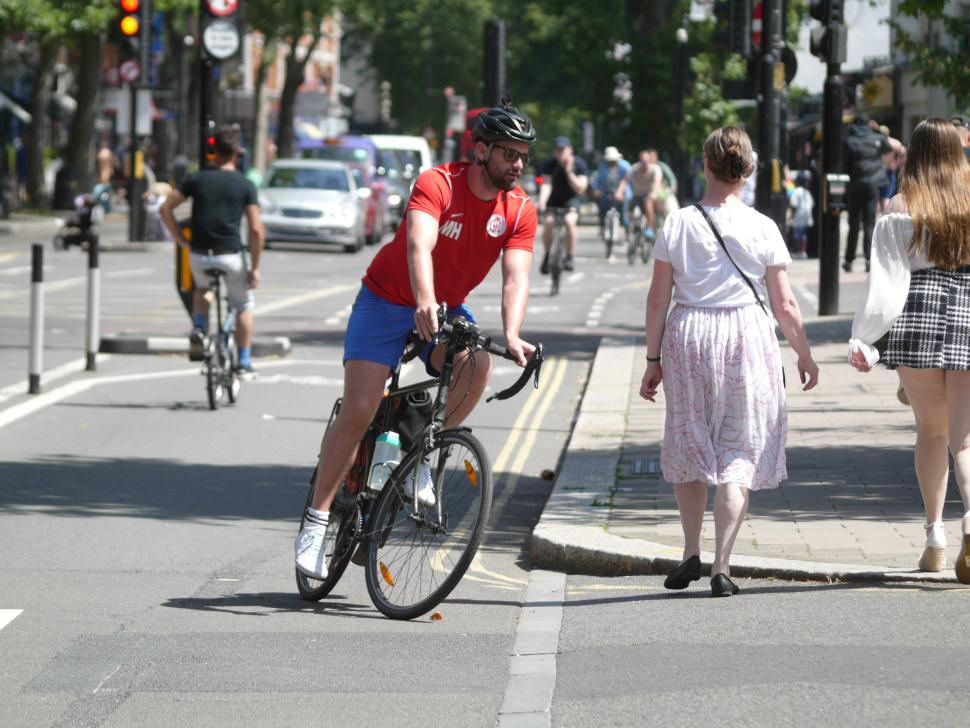- News
- Reviews
- Bikes
- Components
- Bar tape & grips
- Bottom brackets
- Brake & gear cables
- Brake & STI levers
- Brake pads & spares
- Brakes
- Cassettes & freewheels
- Chains
- Chainsets & chainrings
- Derailleurs - front
- Derailleurs - rear
- Forks
- Gear levers & shifters
- Groupsets
- Handlebars & extensions
- Headsets
- Hubs
- Inner tubes
- Pedals
- Quick releases & skewers
- Saddles
- Seatposts
- Stems
- Wheels
- Tyres
- Tubeless valves
- Accessories
- Accessories - misc
- Computer mounts
- Bags
- Bar ends
- Bike bags & cases
- Bottle cages
- Bottles
- Cameras
- Car racks
- Child seats
- Computers
- Glasses
- GPS units
- Helmets
- Lights - front
- Lights - rear
- Lights - sets
- Locks
- Mirrors
- Mudguards
- Racks
- Pumps & CO2 inflators
- Puncture kits
- Reflectives
- Smart watches
- Stands and racks
- Trailers
- Clothing
- Health, fitness and nutrition
- Tools and workshop
- Miscellaneous
- Buyers Guides
- Features
- Forum
- Recommends
- Podcast
 Cyclists at traffic lights, London © Simon MacMichael
Cyclists at traffic lights, London © Simon MacMichaelConservative MP cites "safety" and attempts to reignite cyclist helmet debate
Despite repeated opposition to the idea of mandatory helmet laws for cyclists from his own party's government, one Conservative MP has penned an opinion piece explaining why he believes such legislation should be introduced.
Just last December the Department for Transport insisted that the government has "no intention" to make wearing a helmet while cycling a legal requirement, however Mark Pawsey, MP for Rugby in the West Midlands, has said he will "continue to call for change" having first raised the issue in Parliament in June.
The MP who has held his seat since 2010 expanded on the argument outlined during his initial call for legislation earlier this summer, telling the story of a constituent, then-teenage Oliver Dibsdale who suffered a serious brain injury in a cycling crash when he was not wearing a helmet.
"Before I met Oliver, I took the view that a helmet was a matter of personal choice, and that any legal requirement to wear a helmet would be difficult to enforce," Pawsey wrote in a piece published on Road Safety GB, a road safety organisation last month accused of "victim-blaming" over its promotion of a cycling helmet campaign by another regional group.
"Oliver told me that he usually wore a helmet when cycling and that he bitterly regrets his decision on that occasion to ride without one. He spoke to me in a very moving way about the impact his injury has had on his family and the guilt he feels for the amount of time they have had to spend caring for him. He very much wants to help other families to avoid this fate."
Pawsey recalls how he and Oliver met Trudy Harrison, the head of the Department for Transport at the time, who engaged in an "excellent discussion" but insisted helmets "should be a matter of choice, not compulsory", the view still held by the government.
> Government shuts down mandatory cycling helmets question from Conservative MP
"Oliver continued to disagree," he explained. "And drew my attention to a number of arguments which I have found persuasive. Oliver points out that it is illegal to drive a car without a seatbelt and that it is compulsory to wear a helmet on a motorcycle.
"To this, those who oppose mandatory wearing of cycle helmets respond that there is a health benefit from using a bicycle, and that there should not be any discouragement of cycling. Oliver replies to this that, if people wish to exercise, there are many ways of doing so that present less risk; he points out that people can walk, run, take up a sport or go to the gym.
"Another argument cited by opponents to mandatory wearing of cycle helmets is that legislation would be difficult to enforce. While it would certainly create an additional burden on the police, it does not strike me as particularly difficult to enforce compared with other offences: it is easier to spot a cyclist without a helmet than to spot a driver using a mobile phone, or a car passenger without a seatbelt.
"No one now suggests that wearing seatbelts should be a matter of individual choice on the basis of difficulty in enforcing the relevant legislation."
Pawsey raised the issue during a 'Ten Minute Rule Bill' earlier this summer, asking for the government to "require a person riding a bicycle on the public highway to wear a safety helmet".
"I continue to believe that helmets should be mandatory, particularly for children," he concluded. "Following my Ten Minute Rule Bill, Headway, who are supportive of my call for mandatory helmets for cyclists, have asked me to become a 'Headway Parliamentary Champion'.
> Why is Dan Walker's claim that a bike helmet saved his life so controversial?
"I will continue to call for a change in the law, and I would encourage all readers who share my view to make the case to their own Member of Parliament."
Such change seems unlikely, in December the government responding to a written question from fellow Tory MP Mark Pritchard asking for a mandatory helmet law by saying the matter had been considered "at length" during the cycling and walking safety review in 2018, with the Department for Transport holding "no intention" to make it mandatory.
"The Department considered this matter at length in a comprehensive cycling and walking safety review in 2018 and held discussions with a wide range of stakeholders as part of that review," the DfT said.
"The safety benefits of mandating cycle helmets for cyclists are likely to be outweighed by the fact that this would put some people off cycling, thereby reducing the wider health and environmental benefits. The Department recommends that cyclists should wear helmets, as set out in the Highway Code, but has no intention to make this a legal requirement."
Research published from Australia in the same week as Pawsey's 'Ten Minute Bill' proposal found that cyclists wearing helmets were seen as "less human" than those without.
The research by Mark Limb of Queensland University of Technology and Sarah Collyer of Flinders University found that 30 per cent considered cyclists less than fully human, and that cyclists with helmets were perceived as less human compared to those without, while cyclists with safety vests and no helmets were perceived as least human.
Dan is the road.cc news editor and joined in 2020 having previously written about nearly every other sport under the sun for the Express, and the weird and wonderful world of non-league football for The Non-League Paper. Dan has been at road.cc for four years and mainly writes news and tech articles as well as the occasional feature. He has hopefully kept you entertained on the live blog too.
Never fast enough to take things on the bike too seriously, when he's not working you'll find him exploring the south of England by two wheels at a leisurely weekend pace, or enjoying his favourite Scottish roads when visiting family. Sometimes he'll even load up the bags and ride up the whole way, he's a bit strange like that.
Latest Comments
- mdavidford 15 min 32 sec ago
Should look where they're going.
- pockstone 41 min 39 sec ago
At the heart of great comedy lies truth.
- brooksby 43 min 42 sec ago
"I'm so sorry, I seem to have knocked that mirror. … I'm sorry, I seem to have done it again. And again."...
- Cugel 53 min 41 sec ago
The "more cycling infrastructure" lobby is fixated on their supposed "solution" to the dangers of bad driving, despite an overwhelming amount of...
- Car Delenda Est 1 hour 34 min ago
If it rests on intent then the lock is fine if it's on your own property, you can't really argue the cyclist was eagerly waiting for their bike to...
- David9694 2 hours 57 min ago
Notwithstanding its collapsing circulation, I still get it quoted to me as a source of news and information in my local Comments section. If I...
- hutchdaddy 3 hours 29 min ago
It's clearly a shit car, you won't get your cycle in the back of it and it won't have a CD player.
- essexian 4 hours 47 min ago
Before I had even said this persons home address, my wife said upon hearing the story: "He's from Loggerheads isn't he...."
- Rekrab 13 hours 50 min ago
MORE LANES, MORE LANES!!!!
- Simon E 13 hours 57 min ago
The numbers don't tell anything like the whole story....



Add new comment
127 comments
Out come the usual suspects from their caves
Great film. One of the best. Not the most seminal scene (RIP Fenster). I don't see the relevance here though.
I agree. Not been on TV for a while, hope they show it soon.
He is so moved by Oliver's account of the impact the injury has had on their lives as well as his. Perhaps if he spoke to all the cycling victims of drivers smashing into them he might be moved to change the law to ensure drivers are properly punished and removed from the roads, which would do more for cycling safety than wearing a hat made of plastic and polystyrene. What an ignorant self serving twat.
I am Australian and I was a school commuter when the mandatory helmet laws (MHL) were introduced in the early 90s. Basically overnight our large enclosed, covered bike shed went from 150-200 bikes a day to less than 50. 2 years later the shed was demolished due to lack of use and replaced with all weather bike hoops for the dozen or so kids who still rode to school. Helmets became a point of ridicule in the school yard, with those bullies growing up to become the first generation of cyclist hating drivers.
In terms of improved safety, the Australian Medical Association likes to quote reduced head trauma following MHLs. In absolute numbers there was a small decrease but that was more than offset by the massive reduction in cyclists. The RATE of major head trauma infact increased after MHL. This is arguably due to lower participation rates reducing "safety in numbers", further marginalising a minor group of diminishing size, greater driver entitlement and greater aggression towards cyclists.
Further to the above is the efficacy of helmets. Data shows that helmet efficacy is most meaningful in slow speed incidents involving no other parties, which represent a very small proportion of incidents causing head injury to cyclists on roads. In cases where vehicles collide with cyclists, helmet efficacy is shown to be close to zero due to the potential energy of the vehicle massively overcoming any protective benefit of a helmet.
MHL advocates also like to make the seatbelt vs helmet argument. However, this is a straw man argument in that the two devices do completely different things. Seatbelts reduce the chance of impact with hard surfaces, helmets reduce the transferred energy during an impact with hard surfaces. The equivalent to MHLs for cycling are MHLs for driving. Data shows that wearing a helmet while driving will reduce the severity of head trauma in the event of head collision with hard internal surfaces of a vehicle. So why do we not advocate MHLs for driving? Because the mitigation measure is disproportionate to the risk, as well as creating unintended negative effects that actually increase the risk. Every driver does their own (usually unconcious) risk assessment every time they get in the car. There are scenarios where they will wear a helmet (motorsport) and those where they won't. Cyclists should be afforded the same right to personal risk assessment to determine whether wearing a helmet is a meaningful risk mitigation measure.
I remember watching Neughbours in the 90s (dont look at me like that you all did it) and the cyclists all wore their helmets so badly fitted that it was obvious it was a legal mandate not a choice.
Some of us watched it in the 80s.
You're thinking of Neighbours. I think Neughbours was the new German spin off which only came later.
A lunchtime dose of Scott and Charlene and Harold and Madge got me through my O Levels (1985).
Oh god. Just when you thought the ignorant MPs were hiding their lights under a bushel until the next election, another one pops up. It's hard to believe that an MP calling for a law was so stupid as to do so without doing the most basic research, instead relying on an anecdote from a constituent. We can all sympathise with Oliver Dibsdale, but his case proves absolutely nothing, and for an MP to present it as evidence for his personal crusade is frankly obnoxious.
"He spoke to me in a very moving way about the impact his injury has had on his family and the guilt he feels for the amount of time they have had to spend caring for him. He very much wants to help other families to avoid this fate."
His guilt, totally unearned but probably gained because well intentioned but mistaken people told him he wouldn't have had the injury if he had been wearing a helmet, is not a reason to make the rest of us ride with a magic plastic hat. If Oliver really wanted other families not to suffer as his has, he'd be campaigning for things that actually worked, like stopping drivers knocking us off, but because of his guilt, he can't see past his obsession to what really works.
"Oliver continued to disagree," he explained. "And drew my attention to a number of arguments which I have found persuasive. Oliver points out that it is illegal to drive a car without a seatbelt and that it is compulsory to wear a helmet on a motorcycle."
It is illegal to drive without a seat belt or ride a motorcycle without a helmet, but, like cycle helmets, the data supporting the assumption that they save lives is largely absent and that which does exist is arguable. The MP may find that argument persuasive, but when you're ignorant of the facts, any argument is going to persuade you.
"Following my Ten Minute Rule Bill, Headway, who are supportive of my call for mandatory helmets for cyclists, have asked me to become a 'Headway Parliamentary Champion'.
We can only hope that Pawsey will get some advice from a rather more impartial source, instead of relying on an extremely biased organisation which does not have the safety of cyclists at heart.
I hope that there is a road.cc constituent of his who will point him in the direction of the CUK briefing on helmets, which starts with the phrase "There is no justification for making helmet-wearing compulsory......". https://www.cyclinguk.org/briefing/cycle-helmets
I apologise for the length of this, but as you might have noticed, this is a subject close to my heart.
Always wore a helmet for racing.
Two definite points are heat - motorcyclists are trying to hang onto it and a helmet helps, cyclists are often trying to get rid of it - and clutter.
Being required to click a belt which is part of the vehicle is a minimal imposition (although much inveighed against when it was about to be implemented), being required to put on a helmet to walk to the cafe seems entirely excessive (although in Kiev or Karkov or Gaza it might be prudent) and cycling to the shops for buns lies between those, closer to the peacetime walker.
What?
Heat: motorcyclists are generating minimal body heat yet sitting in a high velocity airstream. They have to dress warm. On the other hand, cyclists are generating a lot of body heat and sitting in a low velocity airstream thus the importance of ventilation for us self-propelled types.
See, it did make sense.
Well, it would have made sense if the writer understood phrasing and punctuation.
Seatbelts work.
They are proven to work.
That's the big difference.
Depends what you consider "work" to be. Yes, they save the lives of car occupants, but they transfer the risk to people outside the car, and overall, no lives are saved. Seat belts are approaching the problem from the wrong end, and making drivers feel safer is futile, as they will use the safety gain as a performance benefit, negating or overwhelming the safety improvement.
I'm not sure that's entirely accurate as drivers have been known to hit other drivers and at least a few inanimate objects such as buildings, walls etc. Maybe speed and acceleration limiting of cars would work better though?
A famous experiment matched two sets of cars, the first with every conceivable safety device, the second the same make and model, but with none of the safety extras. The assumption was that the first group would have fewer injury collisions, but the two groups had the same rate, because the drivers of the first group drove faster and closer to cars in front, thus negating the safety benefits.
The safest car would have no seat belts, air bags, anti-skid brakes, or side impact bars, but a large rusty 14" bayonet sticking out of the steering wheel.
It does seem, in the larger scheme of things, that humans often act most in the interests of safety when obviously unsafe things are all about them. Endless studies of safety protection devices, in cars and elsewhere, show the effect of "risk compensation" wherein safety devices induce a grossly over-estimated feeling of safety with a consequent disregard of still-extant risks. However ....
There's a significant group of humans with personalities (or whatever you want to call their habitual modes of being) in which risky behaviour is commonplace, with little regard paid to the dangers here and there.
In some cultures, risky behaviour is seen as somehow a brave act denoting a strong and independent person. An example I'm very familiar with is the USA "Don't need no stinkin' guard or riving knife on my table saw" resulting in 60,000 serious injuries and many deaths per year in that benighted place. They also like to tote and shoot guns willy-nilly, the dafties!
Even with the steering wheel spikes, some eejits will continue to drive like loons.
In the end, a truly effective solution, dealing with these loons as well as the momentarily careless, is to limit the functions of cars - or to ban the whole notion and technology as it currently exists in favour of transport that has a far, far better safety record. (Rail, bus and even aeroplanes, assuming they can all be made carbon neutral non-polluters, of course).
And lots of bikes, including electric sit-up-and-beggers with capacious panniers, child seats and large buckets to carry your cement mixer.
For a short period.
"Even with the steering wheel spikes, some eejits will continue to drive like loons."
But not for long, thus improving the safety of everyone else, and the gene pool: win-win.
But before Volvo started getting all safe cars were like that, and they drove around like idiots, often pissed, and it is probably lack of power stopping them killing themselves, their passengers and those outside more.
exactly, and removing seatbelts (and potentially replacing with a sharp spike on the steering wheel) would reduce the number of these incidents as
a) drivers would be more careful
b) those that aren't careful could only do it once
With corresponding reductions in impacts to vulnerable road users
After a while they would start customising them...
"...it is easier to spot a cyclist without a helmet than to spot a driver using a mobile phone". The thing is the former is only a danger to themselves while the latter is a danger to everyone.
Please explain how a cyclist without a helmet is a danger to themself?
While a bit of plastic and polystyrene is unlikely to be of any use in a collison with a motorvehicle, they do have some utility. For example a neighbour with whom I used to cycle stopped outside his house late one Sunday morning, took his helmet off and waved the rest of our group on our merry way home. He unclipped a foot, slipped and banged his head against the kerb; he died of his injuries later that day. This is the kind of incident that helmets are actually designed for. I've watched his kids grow up, he hasn't. Of course that's an extreme example but accidents happen and after all you did want an explanation for my comment so please don't go complaining now one's been provided. How individuals choose to mitigate risk is a matter for them; if you don't want to wear one, don't.
Without wishing to cast aspersions on your story, I've never seen or heard of a cyclist taking their helmet off to wave it at departing friends, and while the rest of your story is barely credible, that is less so. It certainly doesn't prove your assertion that a cyclist not wearing a helmet is a danger to themself.
I didn't say he waved his helmet at us. You should read what I wrote. For the sake of clarity - we approached his house. We slowed down. He stopped. Took his helmet off. He waved. He slipped unclipping from a pedal. He banged his head. He died. And this isn't the first time I've recounted the incident during a helmet debate on this site. You asked for an explanation, I was able to provide one. Accepting that some people's views may be different from your own and that they have different but equally valid motivation would perhaps have been a more appropriate way to respond. But each to their own...
I asked you to prove your assertion that a cyclist not wearing a helmet is a danger to themself, and you provide an anecdote about a pedestrian. You seem to have edited your original post to say that he was stopped.
Pages